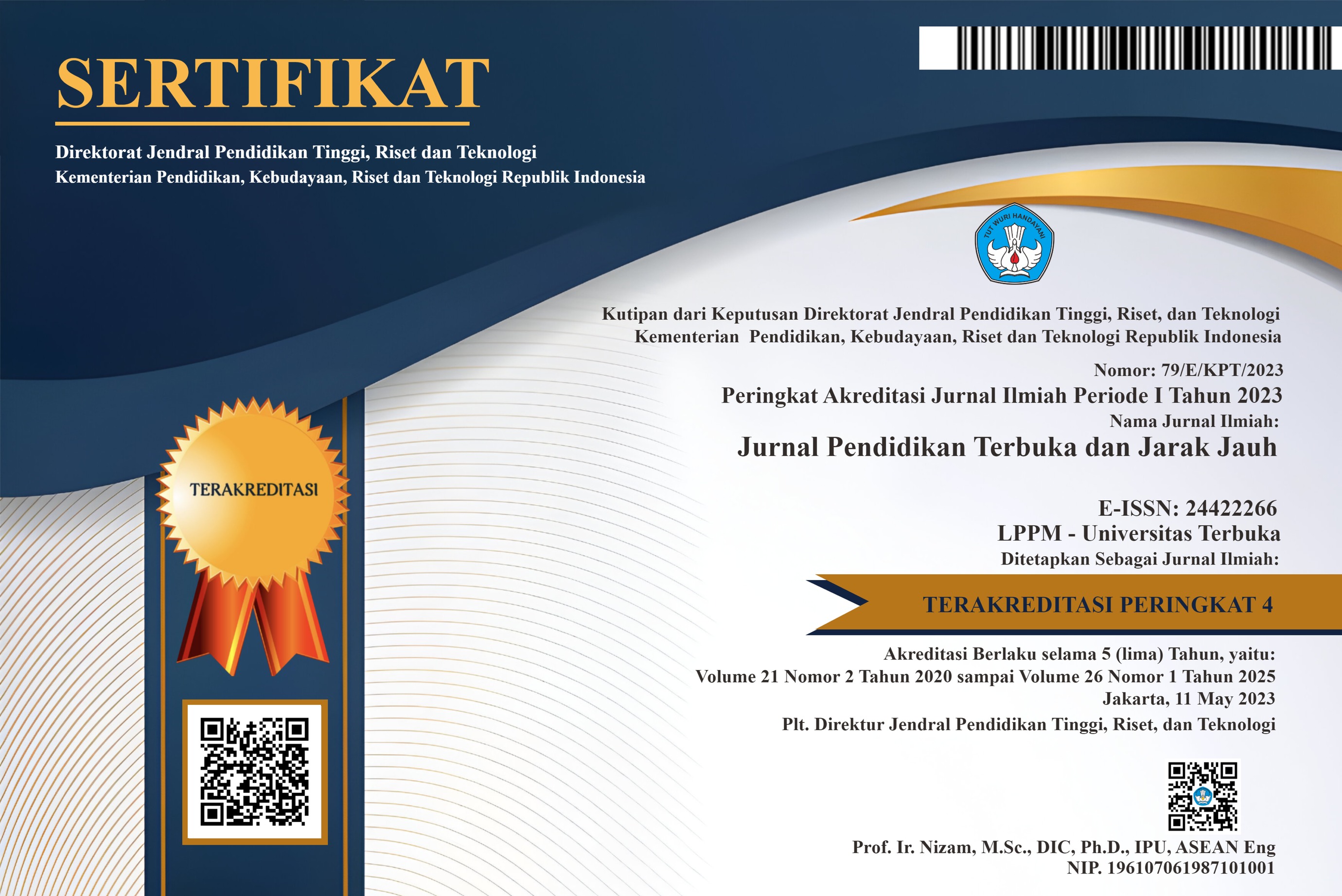Self-Efficacy of Students Taking the English Writing 3 Course in an Online Learning Setting
DOI:
https://doi.org/10.33830/ptjj.v24i2.6282.2023Keywords:
English Writing course, online tutorial, self-efficacyAbstract
The aim of this study was to examine the self-efficacy of students taking the English Writing 3 online tutorials at Universitas Terbuka. This study applied a quantitative approach and survey method was used to collect data. A single-stage sampling procedure was adopted to collect information about student self-efficacy. Using a questionnaire to collect data, a thorough understanding of student self-efficacy was developed. Student self-efficacy was scored on a five-point scale. The research participants were students taking the English Writing 3 online tutorials. Of 650 students, 233 students completed and returned the questionnaires. Descriptive analytics were used to describe and summarize the data in order to provide the ground for finding new facts. The findings indicated that the majority of students had high self-efficacy. The students demonstrated sufficient ability, confidence, and resilience to accomplish certain tasks that were necessary for their learning This study confirmed that male and female students did not significantly differ in self-efficacy. It was found that there may be a link between age (maturity) and self-efficacy. In addition, self-efficacy could be attributed to previous learning experience. It was apparent from this study that self-efficacy was dynamic; self-efficacy development and growth were likely influenced by student learning progressions. The present study has provided a deeper insight into the nature of students learning English writings in an online distance learning environment.
References
A. Jaradat, S., & O. Ajlouni, A. (2020). Social Presence and Self-Efficacy in Relation to Student Satisfaction in Online Learning Setting: A Predictive Study. International Journal of Education and Practice, 8(4), 759–773. https://doi.org/10.18488/journal.61.2020.84.759.773
Agung, A. S. S. N., Siboro, E. S., & Quinones, C. A. (2022). Exploring the Level of Students’ Self-Efficacy in Speaking Class. LLT Journal: A Journal on Language and Language Teaching, 25(2), 651–659. https://doi.org/10.24071/llt.v25i2.4432
Ahmadipour, H. (2022). Online learning self-efficacy: A necessity for virtual education. Journal of Education and Health Promotion, 11(1), 113. https://doi.org/10.4103/jehp.jehp_848_21
Alhadabi, A., & Karpinski, A. C. (2020). Grit, self-efficacy, achievement orientation goals, and academic performance in University students. International Journal of Adolescence and Youth, 25(1), 519–535. https://doi.org/10.1080/02673843.2019.1679202
Aljaraideh, Y., & Al Bataineh, K. (2019). Jordanian Students’ Barriers of Utilizing Online Learning: A Survey Study. International Education Studies, 12(5), 99–108.
Allen, M. S., Iliescu, D., & Greiff, S. (2022). Single Item Measures in Psychological Science. European Journal of Psychological Assessment, 38(1), 1–5. https://doi.org/10.1027/1015-5759/a000699
Alonso-Mencía, M. E., Alario-Hoyos, C., Estévez-Ayres, I., & Delgado Kloos, C. (2021). Analysing self-regulated learning strategies of MOOC learners through self-reported data. Australasian Journal of Educational Technology, 56–70. https://doi.org/10.14742/ajet.6150
Bandura, A. (1997). Self-Efficacy: The Exercise Control. W.H. Freeman and Company.
Bandura, A. (2006). Guide for Constructing Self-Efficacy Scales. In F. Pajares & T. Urdan (Eds.), Self-Efficacy Beliefs of Adolescents (pp. 307–337). Information Age Publishing.
Bhati, K., Baral, R., & Meher, V. (2022). Academic Self-Efficacy and Academic Performance among Undergraduate Students in Relation to Gender and Streams of Education. Indonesian Journal of Contemporary Education, 4, 80–88. https://doi.org/10.33122/ijoce.v4i2.35
Cherry, K. (2023, February 27). Self-Efficacy and Why Believing in Yourself Matters. https://www.verywellmind.com/what-is-self-efficacy-2795954
Creswell, J. W. (2009). Research Design: Qualitative, Quantitative, and Mixed Methods Approaches (3rd ed.). Thousand Oaks.
Cui, Y. (2021). Self-efficacy for Self-regulated Learning and Chinese Students’ Intention to Use Online Learning in COVID-19: A Moderated Mediation Model. International Journal of Information and Education Technology, 11(11), 532–537. https://doi.org/10.18178/ijiet.2021.11.11.1561
Emin, Ö., & Karaca, N. (2021). Investigating learner motivation in online education in terms of self-efficacy and self-regulation. Journal of Educational Technology and Online Learning, 4(4), 745–758.
Filcher, C., & Miller, G. (2000). Learning Strategies for Distance Education Students. Journal of Agricultural Education, 41(1), 60–68. https://doi.org/10.5032/jae.2000.01060
Fiorini, L. A., Borg, A., & Debono, M. (2022). Part-time adult students’ satisfaction with online learning during the COVID-19 pandemic. Journal of Adult and Continuing Education, 28(2), 354–377. https://doi.org/10.1177/14779714221082691
Fornell, C., & Larcker, D. F. (1981). Evaluating Structural Equation Models with Unobservable Variables and Measurement Error. Journal of Marketing Research, 18(1), 39–50. https://doi.org/10.1177/002224378101800104
Hair, J. F. Jr., Black, W. C., Babin, B. J., & Anderson, R. E. (2010). Multivariate Data Analysis: A Global Perspective (7th ed.). Pearson.
Kundu, A. (2020). Toward a framework for strengthening participants’ self-efficacy in online education. Asian Association of Open Universities Journal, 15(3), 351–370. https://doi.org/10.1108/AAOUJ-06-2020-0039
Kuo, Y.-C., Tseng, H., & Kuo, Y.-T. (2020). Internet self-efficacy, self-regulation, and student performance: African-American adult students in online learning. International Journal on E-Learning, 19(2), 161–180.
Mel, W. De, Fernando, W., & Kumara, I. (2022). Online Learning Self-Efficacy of Undergraduates: Evidence from A University in Sri Lanka. International Journal of Research and Innovation in Social Science, 06(10), 05–11. https://doi.org/10.47772/IJRISS.2022.61001
Panergayo, A. A., & Mansujeto, K. (2022). Assessment of Self-Efficacy in Online Learning of Teacher Education Students in one state University in the Philippines. International Journal of Computing Sciences Research, 6, 680–693. https://doi.org/10.25147/ijcsr.2017.001.1.65
Qayyum, A. (2018). Student help-seeking attitudes and behaviors in a digital era. International Journal of Educational Technology in Higher Education, 15(1), 17. https://doi.org/10.1186/s41239-018-0100-7
Universitas Terbuka. (2023). UT Dalam Angka. https://www.ut.ac.id/ut-dalam-angka
Wang, Y., Xia, M., Guo, W., Xu, F., & Zhao, Y. (2022). Academic performance under COVID-19: The role of online learning readiness and emotional competence. Current Psychology, 1–14. https://doi.org/10.1007/s12144-022-02699-7
White, B., & Frederiksen, J. (2005). A Theoretical Framework and Approach for Fostering Metacognitive Development. Educational Psychologist, 40(4), 211–223. https://doi.org/10.1207/s15326985ep4004_3
Yavuzalp, N., & Bahcivan, E. (2020). The online learning self-efficacy scale: Its adaptation into Turkish and interpretation according to various variables. Turkish Online Journal of Distance Education, 21(1), 31–44.
Downloads
Published
How to Cite
Issue
Section
License
Copyright (c) 2023 Rahmat Budiman

This work is licensed under a Creative Commons Attribution-ShareAlike 4.0 International License.





